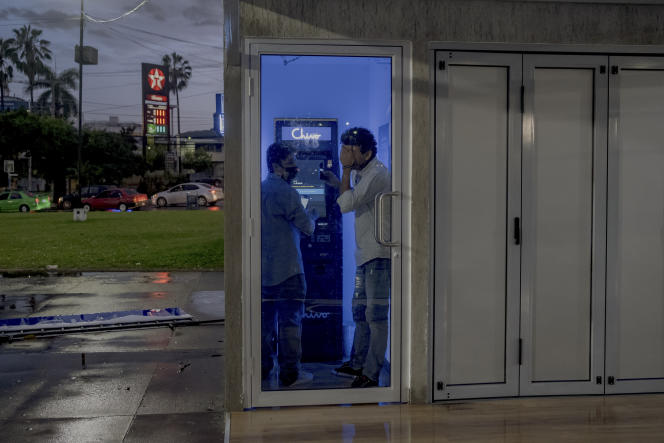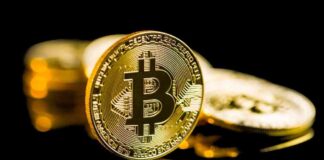Dressed all in white, cap backwards, Nayib Bukele exults: “We will build Bitcoin City! The Salvadoran president speaks in English in front of an audience of foreign “bitcoiners” who have come to attend Bitcoin Week in the first country to have adopted, on September 7, 2021, the crypto-asset as its official currency. “It will be a real municipality, with a mayor and all!” “, promises the head of state. A free zone, powered by geothermal energy from the Conchagua volcano, which will also be used for mining – the energy-intensive calculations used to authenticate bitcoin transactions. To finance this monumental project, he announces, cryptobonds will be issued for a value of 1 billion dollars (1 billion euros).
It was November 20, 2021. Nine months later, no stone has yet been laid. And no cryptobond issued. Blame it on the international context: “All the markets are upside down because of Covid-19, galloping inflation and the war in Ukraine”, pleads the Minister of Economy, Alejandro Zelaya.
Authorities continue to defend their decision to make bitcoin legal tender. And attribute to it a supposed increase in foreign investment and the fact that international tourism has returned to its pre-pandemic level. About fifty bitcoin-related companies have already settled. Stacy Herbert and Max Keiser, a couple of American journalists specializing in cryptocurrencies, were attracted by the facilities granted to bitcoin investors. They created a fund to finance start-ups contributing to the “hyperbitcoinization” of the country. “Bitcoin is the future of El Salvador,” says Herbert.
The balance sheet is mixed
Jorge Cruz Rubio, coffee producer, created in their honor his Satoshi Specialty Blend line (reference to the pseudonym of the creator of bitcoin). On the package, the orange “B” and the mask of Anonymous. Mr. Cruz offers discounts if the purchase is made in bitcoins. “This currency is a way to transact globally from my plantation in Ahuachapan, instead of spending hours in town and paying commissions,” he explains.
However, a year after the introduction of this currency, the results are mixed. While the “bitcoin” law has put El Salvador in the forefront of the international scene “for something other than the violence of its gangs”, rejoices Mr. Zelaya, its use by the population is far from being there. .
In the Metrocentro mall, frequented by the middle class, a good half of the stores accept it. But at San Salvador’s most popular covered market, the answers are unanimous: “We don’t take bitcoin. Same answer as soon as you move away from the capital.
Jorge Cruz receives us in the Maison du bitcoin, opened in February with foreign funds to train individuals and entrepreneurs in the use of cryptocurrency. He admits that eight out of ten of his employees ask to be paid in dollars instead, the country’s currency since 2001. A survey by the Chamber of Commerce and Industry showed that 14% of companies received payments in bitcoins. And only 3% consider that accepting cryptocurrency has helped increase their level of sales. According to a Central American University poll conducted in May, 71% of the population believe they have not benefited from the “bitcoin” law.
“I removed everything”
Most of the 4 million people who have downloaded the Chivo Wallet app, a wallet for bitcoin exchanges, say they did so to earn the equivalent of $30 – 10% of minimum wage – offered to encourage adoption of cryptocurrency. Supposed to avoid the commissions of companies like Western Union when transferring money from the diaspora, here again bitcoin has failed: barely 2% of shipments are made by this means. “This law is a failure,” said economist Carlos Acevedo, former president of the Central Reserve Bank. When El Salvador adopted the dollar, the colon [the national currency] had practically disappeared within a year. »
Sergio Vega, a 42-year-old salesman met in front of one of the 200 Chivo ATMs where you can buy bitcoins or withdraw dollars, found the idea interesting, “at first”. “The $30 was helpful,” he says. Then I saw that my few savings had collapsed. I removed everything. Bitcoin is more useful to the government than to people like me. »
For Stacy Herbert, it is only a matter of time before Salvadorans get used to it: “When France switched to the euro, bills showed the equivalent in francs for over ten years! In the meantime, it is the most unpopular measure of a president who still obtains 87% of favorable opinions, three years after taking office, catalyzing the first protests as early as September 2021.
The fall in the price of bitcoin, from 52,000 dollars on September 7, 2021, to 18,802 dollars a year later, frightened a population that earns its living from day to day and has no capacity to save. “It’s a measure disconnected from the economic needs of the country,” said economist Tatiana Marroquin, a specialist in public finance.
Foreign direct investment is down
But Nayib Bukele does not budge: bitcoin will save El Salvador, freeing it from the decisions of foreign central banks. Sincerity of a millennial influenced by his brothers Yusef and Ibrajim, true craftsmen of the “bitcoin” law? It is difficult to know the intentions of a president who governs in an increasingly authoritarian manner – and refuses interview requests.
For the past year, he has been tweeting about his purchases of bitcoins for state coffers: a total of 2,381 bitcoins, which cost $107 million, according to Nayibtracker.com. They are worth 45 million today. How are these purchases made? By who ? Have bitcoins been resold and at what rate? Local media have questioned the authorities, without success: the information is classified. “Bitcoins are purchased with public funds, so the information should be public,” argues Wilson Sandoval of the Center for Anti-Corruption Legal Advice.
“When the government announces an increase in foreign investment or tourism thanks to bitcoin, we can also ask ourselves questions, believes Tatiana Marroquin, because there is no public indicator to support it. In fact, foreign direct investment is down 5.8% in the first quarter of 2022.
In a country where all powers have been co-opted, including the Financial Investigation Unit, the Constitutional Court and the Public Prosecutor’s Office, fears are high that possible money laundering will not be investigated, “for lack of independent authority that can trace bitcoin transactions,” says Sandoval. Members of Mexican cartels and Salvadoran gangs are already taking advantage of Chivo ATMs to withdraw dollars.
Negotiations stalled with the IMF
“Ultimately, summarizes Ricardo Castaneda, of the Central American Institute for Fiscal Studies, the winners of bitcoin are the foreign companies that have developed the Chivo Wallet or those that have used El Salvador for money laundering. And the losers? “The Salvadorans, because regardless of whether or not they use bitcoins, the use of public resources to purchase them implies that the population has paid the cost. »
While tax revenues are up sharply and inflation remains the lowest in the region, negotiations with the International Monetary Fund for a loan have stalled (“the deal is under construction”, nuance Minister Zelaya), the institution recommending to limit the scope of the “bitcoin” law. Country risk, which measures the risk of a government defaulting, is at its highest: El Salvador is vying for the top spot in emerging markets with Argentina.
Cryptobonds were supposed to reassure investors: debt has gone from 70% of GDP in 2019 to almost 85%. In January 2023, El Salvador will have to repay an $800 million tranche of bonds, the value of which had plummeted in recent months. President Bukele announced, at the end of July, a daring bet: the redemption of part of these bonds maturing in 2023 and 2025 (1.6 billion dollars), without waiting for their maturity, at their current rate, therefore lower . “If creditors prefer to wait and receive their 100% reimbursement, they can, but if they fear a default, they have this option,” the economy minister told Le Monde. Immediate results: Eurobond rates rose and country risk fell 10 points – before rising again the next day. But economists doubt that creditors will accept the proposal.
Some see the “bitcoin” law as a way to distract from the many attacks on the rule of law since Nayib Bukele came to power in 2019. The country has been living under a state of emergency since March 27, after a wave of gang killings. Over 51,000 people were detained; NGOs denounce arbitrary arrests and torture.
The government, on the other hand, says it is going straight ahead: “Bitcoin City planning continues. Our strategy is intact”, assures Minister Zelaya, for whom cryptocurrency is an “inexorable” phenomenon that must be mastered: “We can embrace it and regulate it, or close our eyes and decree that it is no use nothing. But, sooner or later, reality will be in front of you. So, do we learn to live with both worlds, or do we settle for yesterday’s world? »

















